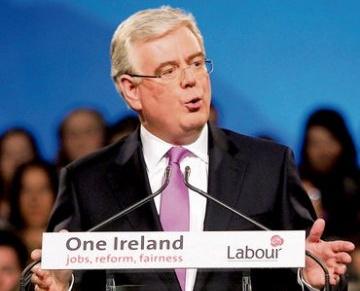Gilmore set to damage himself and Labour

Fianna Fáil might be right about Eamon Gilmore. Give him enough time and he could do in himself and the Labour Party, or at least do himself and Labour serious damage, writes Vincent Browne.
Gilmore rose to that challenge impressively in an interview with Sean O'Rourke on RTE Radio 1 during the week and hinted at just how much harm he could do, if given the chance. But before I get into that, allow me to set the context.
This is the most propitious time for Labour in its history. It has a chance of leading the next government, setting the agenda of that government and realising much of what Labour traditionally, or at least supposedly, stands for: more equality, deeper democracy, that sort of stuff.
It has no chance of leading a government including Fine Gael, for Fine Gael is certain to win more seats that Labour in March. But there is another possibility.
Since this is the time for Labour you'd expect them to set about the following:
Devise a detailed policy programme, showing how they propose to make this society more equal and more democratic – redistribution of income and wealth, far better social protection programmes, one-tier health and education systems, job creation or job stimulus programmes, plans to broaden the participation of the people in democratic decision-making. Whilst, of course, dealing with the deficit problem and off-loading the banking fiasco.
Yes, they would lose middle class votes - especially with the bits about wealth and income redistribution - but that shouldn't be much of a problem, for unless Labour disintegrates it will win more seats in the next Dáil than it has ever done before.
Then after the election Labour might find it possible to form a new government with itself in the lead position, along with Sinn Féin, which is fairly compatible policy-wise, and, yes, Fianna Fáil.
Sinn Féin is gagging to get into government in the South, since it is enjoying so much being in government in the North. Fianna Fáil has a few advantages: it is policy neutral, which means it doesn't really mind what policies it endorses and even if those policies were to annoy their former funders, these former funders have no funds anymore so they don't matter. And Eamon Gilmore would be Taoiseach and Labour would set the agenda.
It might be that leaving the prospect of Fianna Fáil remaining in office would damage Labour, and/or allowing for the prospect of Sinn Féin in government might damage Labour – but if Labour is seriously committed to changing society, these are risks it has got to take.
Now, it might emerge that Fianna Fáil is not psychologically fit to go into government again and/or psychologically unable to go into government with another party leading the way and/or it might think if it waits five years it could be fairly certain of getting back into office for another generation or so. In which case the strategy wouldn't work.
But it might work, and if it did then Labour's chances of implementing a radical agenda that could change the face and nature of this society would be much better than going into government as the minority party with Fine Gael.
By far the best chance Labour could have of getting its policies implemented – assuming these policies were even vaguely socialist - would be to form a coalition with Sinn Féin and Fianna Fáil after the next election. And even if that were only a prospect after the next election, it would strengthen Labour's hand in negotiations with Fine Gael about a programme for government.
But in that interview last week Eamon Gilmore ruled all that out – Labour is going into government with Fine Gael after the next election, come what may. He didn't even suggest a precondition that Labour would have to agree a programme for government that would include much of the Labour agenda, or indeed any of the Labour agenda. No. Labour is going to go into government with Fine Gael and that's it. Asked again and again why he would not contemplate going into government with the more policy-compatible Sinn Féin, he simply couldn't answer.
Yes, there was the palaver about Labour wanting to be the biggest party and lead the next government but that is not going to happen and he knows that. Even if Labour were to get more first preference votes than Fine Gael it would still have fewer seats because Fine Gael is stronger organisationally around the country.
So what Eamon Gilmore was communicating is that changing the face and nature of Irish society doesn't matter, or matters less than Labour getting back into office as soon as possible. That the priority is not the creation of a more equal and more democratic society, it is the attainment of office.
Yes, it is true that that too is the primary objective of Fianna Fáil and Fine Gael but they are not so crude as to put it that way. Eamon Gilmore has, and if there were ever a good reason not to vote for a party that is it.
